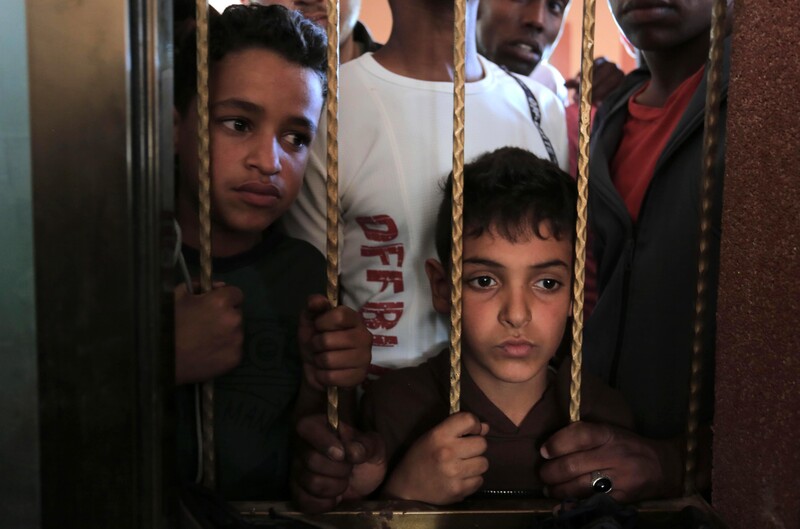Power Suits 15 November 2019

Relatives of the al-Sawarka family mourn during the funeral in Deir al-Balah, central Gaza Strip. Eight members of the family, including five children, were killed in an Israeli missile strike Thursday.
APA imagesThere is much speculation about the timing of Israel’s assassination of an Islamic Jihad leader, Baha Abu al-Ata and his wife, Asma.
Why rock the boat now? The killing came in the middle of Israeli coalition negotiations, that – if they fail – could lead to an unprecedented third election in a year.
It came during a period of Egyptian-mediated calm between Israel and Hamas that had raised hopes that not only would Israel’s draconian siege on Gaza be eased a little, it could secure a longer-term cessation of hostilities, as well as pave the way for Palestinian elections, long overdue.
And finally, and with a more or less simultaneous attack on an Islamic Jihad leader in Damascus (which missed its apparent target, Akram al-Ajouri, but killed a son, Muath, and a granddaughter, Batoul) it came at a time when there are plenty of other hotspots in a region that seems perpetually poised on some disastrous precipice.
Why escalate at this time?
Several explanations have been put forward.
Benjamin Netanyahu, Israel’s lame-duck prime minister, wanted personal revenge after a rocket reportedly fired by Islamic Jihad disturbed one of his public appearances in September at the height of this year’s second election campaign.
Perhaps Netanyahu wanted to scupper efforts by his rival Benny Gantz to form a coalition government without him. A conflagration could lead to a surge in popular pressure for a broad national unity government between Netanyahu’s Likud and Gantz’s Blue-White alliance.
Or the Israeli military simply took an opportunity when it presented itself. According to this explanation, Abu al-Ata had been in the crosshairs for two years because he had proven a thorn in the side during efforts to secure a lasting truce in Gaza and had effectively gone rogue.
In fact, this theory contends, it was in everyone’s interest to see Abu al-Ata gone, including Hamas, which wants quiet, and the Islamic Jihad hierarchy, which was tired of having a loose cannon on the books.
Abu al-Ata’s murder, according to this theory, will see Egyptian mediators intensify efforts to secure a more lasting truce in and around Gaza.
Impunity
All explanations are plausible. And all miss the point.
Netanyahu may well have sought some kind of personal vengeance against a group that, according to Israeli media, had given the finger to his self-styled image as Mr. Security.
Or he might have thought that a little rocket fire was a small price to pay to try and secure a unity government and force through long-sought legislation to ensure immunity for himself against corruption charges.
Or, indeed, the Israeli military may have just been itching to go and then, after two years, found a window to kill not one but two Islamic Jihad leaders at pretty much the same time, one in Gaza and one in Damascus.
Possibly all these explanations are true at the same time.
More likely they are simply afterthoughts.
What is clear is that the Israeli military acts with impunity.
The Israeli media made much of Abu al-Ata being a “ticking time bomb”, though he was clearly not an imminent danger when he was killed.
And yet, was there any protest from anyone at an act of clear, unprovoked aggression?
The UN’s Middle East envoy Nikolay Mladenov condemned only the rocket fire that came in response to Abu al-Ata’s slaying, decrying the “indiscriminate” rocket fire as “absolutely unacceptable,” while having nothing to say about the assassination itself, which he described as a “targeted killing.”
Targeted? “Surgical precision?”
Maybe Asma Abu al-Ata would have had something to say about that, if she hadn’t been murdered herself. Or indeed Muath and Batoul.
Apparently, it is open season not only in Gaza, occupied territory as it is, but in Damascus, where Israel – which has not commented on that strike as per usual protocol – killed two civilians in a sovereign country.
Is that not an act of war?
Thirty-four Palestinians were killed over a 48-hour period. Half of them were civilians, eight of them children.
Where is the outcry?
What now for Hamas?
Truth is, no one is bothered. And Hamas has found, as the Palestinian Authority did before, that it is in a lose-lose situation.
Gaza’s two million people remain under lock and key, their daily calories carefully calculated to avoid out-and-out starvation.
They are isolated from the world, impoverished, unable to travel, barred from developing infrastructure, and prevented from importing a long list of goods, many of which are necessary to begin rebuilding this devastated strip of land.
Hamas has the task, as the PA had before it, of trying to enforce calm simply in order not to provoke Israel to inflict more pain.
Moreover, and just like the PA before it, it has that task without any pay-off.
There is no political horizon for Palestinians. Certainly, none offered by a world unwilling and incapable of holding Israel to task.
Hamas may hold fire. It might convince other factions to hold fire in return for a few more goods allowed through the crossing and a few more miles of fishing off the coast.
Important for survival, yes. But then what?
If Palestinians have nowhere to turn and no story to pursue to a happy ending, so too are Israelis void of ideas. They are also morally bankrupt.
Israel tells a tale full of monsters. But fairy tales resist rational thinking.
We can speculate as much as we like about why Israel acted as it did and why now.
The answer would seem simply to be: why not? Israel bombs Gaza because it can.




